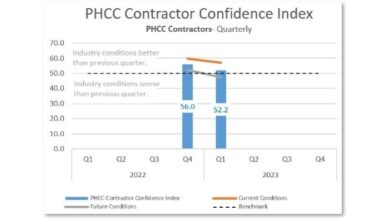Building the Pipeline: Preparing Tomorrow’s Workforce
By Mike Hedquist & April Keizer

It cannot be overstated that choosing a career in the skilled trades should be about enjoying the work if not being passionate about it. So, any opportunity to get a taste for the work environment, skills required and surrounding personalities is worthwhile. Apprenticeships are a great way to build the worker pipeline. The United Association of Journeymen and Apprentices of the Plumbing and Pipefitting Industry offers a robust apprenticeship program, alongside a number of additional training and career development resources that are worth considering. For those seeking non-classroom based instruction, the Plumbing-Heating-Cooling Contractors Educational Foundation offers PHCC Academy as an alternative route to plumbing and HVAC apprenticeship that is recognized by the U.S. Department of Labor. The International Association of Plumbing & Mechanical Officials also offers both in-classroom, online and state-specific training to accommodate the myriad ways professionals of all kinds learn best.
These programs can be a game changer when slots in a coveted trade school seem hard to come by. While we can’t comment on what the situation looks like across the nation, here in Minnesota (where Harris is headquartered), schools can only take as many students as will fit in a class. Letters of recommendation from any kind of summer work, apprenticeship or helper program can go a long way to making an applicant more competitive, though.
For talented adults looking to change careers but uncertain how to get started, the options are plentiful. As an example, veterans looking to transition from the military into construction can take advantage of programs like TRANE’s Combat to Controls or Helmets to Hard Hats. The Home Depot even has training programs for a wide range of adult job seekers via its Path to Pro program.
It’s worth noting there are numerous helper and social programs for young people nationwide who have interest in exploring a career in the trades. Harris has a partnership with Lake Street Works, for example, which provides valuable life-skills training to underprivileged youths so that they can learn how to be a desirable employee when the time comes to go out and find work.
On top of guiding the next generation of workers to the right training, it’s imperative that contractors take an active role in keeping their workforce on top of emerging trends, skills and best practices. This doesn’t just open more opportunities for growth and success to the employee, after all. By investing in the existing workforce, contractors can stay agile and nimble in an industry that is changing almost daily. Apprenticeships and training programs (at Harris, we offer Rotational Training Programs, for example) are just a couple ways that contractors can build off the knowledge and experience any new hire brings with them or offer opportunities for existing employees to further develop their own. As an example, to keep up with new technologies and trends in building automation and controls, employers can partner with the Smart Buildings Academy to offer certificate programs across a wide range of training paths.
Internally, employers should consider making use of career pathing to support individuals and teams in setting, achieving and exceeding their professional goals. Think of it as designing a map toward a professional destination an employee wants to be at in three, five or even 10 years. Let’s say, for example, that an employee wants to be on the path to project manager. By creating an inventory of the skills required to succeed in that position, then referencing it against an inventory of the skills the employee already has, we can set a trajectory that positions them to master whatever competencies they are missing, enhance competencies they already have and set them up to achieve their goal. The result? Boosted productivity, performance and reduced turnover.
The biggest takeaway, perhaps, is the more contractors invest in making programs and learning opportunities available to professionals both emerging and existing, the more future proof industry will be. Ultimately, prioritizing the training of tomorrow’s workforce today is simply good business.
Mike Hedquist is field operations manager at Harris.
April Keizer is director of human capital at Harris.


